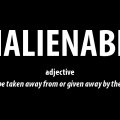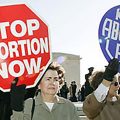In a statement released by Vice President Joe Biden a few days ago for the “International Day Against Homophobia and Transphobia” (apparently that’s a thing), he addressed issues facing the LGBT community. His short statement was not policy-heavy and was based primarily on the notion “that everyone, everywhere is entitled to be treated with dignity and respect”—a lesson he learned from his father. I have no problem with that notion, and in fact, I more or less agree with it in principle. (I would argue that “respect” specifically is earned, not owed, but that standard has nothing to do with someone’s sexual orientation.)
What I take issue with is his statement that “In too many places, LGBT community members face violence with impunity, mistreatment by police, the denial of healthcare, or religious condemnation and social isolation.” (Emphasis added.) Now, I have no tolerance whatsoever for violence or police mistreatment—no one should face such things. “Denial of healthcare” is a bit vague, and while I don’t think anyone has an inherent right to healthcare (or to any goods or services), I do oppose policies which allow for discrimination in government-funded or government-provided services. My concern with his statement is that lumping “religious condemnation” and “social isolation” in with “violence” and “police mistreatment” creates a false equivalence.
Violence and police mistreatment constitute an abrogation of an individual’s natural rights; the opinions which people hold and the exercising of their freedoms of speech and association do not.
Some religions condemn certain clothing, eating meat (or certain kinds of meat), drinking alcohol, and even drinking coffee. Many condemn premarital sex and divorce. Most condemn abortion. There are many reasons why someone might find themselves subject to religious condemnation, but so long as that condemnation does not escalate to the use of physical force, it does not constitute a violation of anyone’s rights. People have the right to consider whatever conditions, choices, or actions they wish to be sins, but they don’t have the right to use violence against those they consider to be sinners. That’s the line. The initiation of force (i.e. violence or aggression) is on one side of it and thoughts, opinions, and free speech are on the other.
Now for “social isolation.” To put it simply (and in terms libertarians will understand), I owe you only non-aggression. I don’t owe you a smile, a wave, or an invitation to my barbecue. If my motive for denying you such things is indeed bigotry, I may well be subject to retaliatory (and well-deserved) social isolation—and that won’t constitute a violation of my rights, either. The ability to shun someone is actually more of an important tool for preventing (or punishing) discrimination than it is a way to carry out discrimination.
It’s an undeniable fact that the LGBT community has suffered—and continues to suffer in some countries—violence and police mistreatment, and no one should condone such things. It is also true that they have, in some cases, been subject to religious condemnation and social isolation, but these actions are not crimes nor do they constitute aggression or violence. Bigotry is an unfortunate side effect of free will, and attempting to educate narrow-minded individuals or to persuade them to think differently is an appropriate solution. Creating a false equivalence between actual violence and thoughts or speech, however, is as dangerous as it is fraudulent. Not that I have very high expectations of Joe Biden, mind you, but his speechwriters, at least, should understand the difference.





